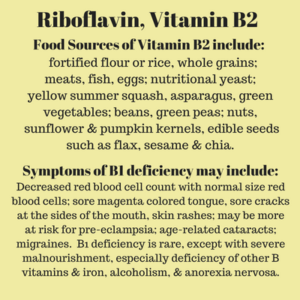Riboflavin (also known as vitamin B2):

Deficiencies of other B vitamins can cause a deficiency of riboflavin and vice versa. Riboflavin is involved in the metabolism of vitamin B6, niacin, folic acid and iron. Riboflavin is also needed for metabolism of drugs and toxins and is essential for releasing energy from food.
Alcoholics, anorexics, and people low in other B vitamins are at risk of deficiency but otherwise deficiency is rare. Riboflavin is in many foods.
Deficiency symptoms may include decreased red blood cell count with normal sized red blood cells; sore throat; magenta/red inflamed tongue, mouth, and throat; sore cracks at the sides of the mouth; and skin rashes. Deficiency may increase risk of pre-eclampsia and age related cataracts. Supplemental riboflavin was found helpful for preventing migraines.
Food Sources of Riboflavin (B2) include:
Fortified flour & cereal, whole grains, meats, fish, milk, eggs, meat, fish, beans, nuts, and seeds, nutritional yeast flakes, asparagus, broccoli, yellow summer squash, spinach.
Risks of overdose for water soluble B vitamins and vitamin C are rare:
B vitamins and vitamin C are water soluble, so overdose is rare. Deficiency is more common because the nutrients are not stored like the fat soluble nutrients: A, D, E, and K; and water soluble vitamins are not conserved by the kidneys like the electrolyte minerals: calcium, sodium, magnesium, and potassium.
Riboflavin is a bright yellow nutrient and when taking higher doses in supplements may cause a bright yellow colored urine – it is non-toxic and would be less noticeable, a paler shade of yellow, when plenty of water is also being drunk throughout the day. Any time dehydration is present the color of the urine will be a darker shade and is a good reminder to try to drink plenty of water – 6-10 glasses roughly depending on body size, and amount of exercise performed and the level of heat or humidity in the environment.
REFERENCE USED FOR FOOD SOURCES & SYMPTOMS OF Riboflavin DEFICIENCY:
- An Evidence-based Approach to Vitamins and Minerals: Health Benefits and Intake Recommendations, 2nd Ed., by J. Higdon & V. Drake, (Thieme, Stuttgart / New York, 2012) [Amazon]
- A description and source for purchasing the text: http://www.thieme.com/books-main/complementary-medicine/product/1040-an-evidence-based-approach-to-vitamins-and-minerals
- A review of the text: http://ajcn.nutrition.org/content/79/5/892.full
- The text is produced in cooperation with the Linus Pauling Institute. He is a researcher who used large doses of vitamin C to cure cancer tumors. His work was met with skepticism. More recently research supports his work in that a specific type of cancer cells is very susceptible to vitamin C – while to the rest of the body it is water soluble and non-toxic at the level that was toxic to the cancer cells. http://www.sciencedirect.com/science/article/pii/S2213231716302634
Disclaimer: Opinions are my own and the information is provided for educational purposes within the guidelines of fair use. While I am a Registered Dietitian this information is not intended to provide individual health guidance. Please see a health professional for individual health care purposes.
Other References:
- [dietandfitnesstoday.com/riboflavin-in-beans.php]
- https://ndb.nal.usda.gov/ndb/foods/show/45194432?fgcd=&manu=&format=&count=&max=25&offset=&sort=default&order=asc&qlookup=nutritional+yeast&ds=&qt=&qp=&qa=&qn=&q=&ing=
- https://draxe.com/top-10-vitamin-b2-riboflavin-foods/
- http://healthyeating.sfgate.com/definition-riboflavin-6444.html
- https://www.swansonvitamins.com/blog/lindsey/types-of-squash-health-benefits
